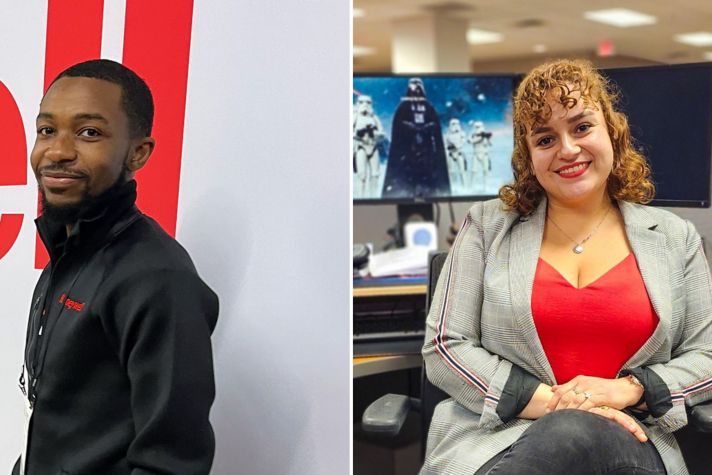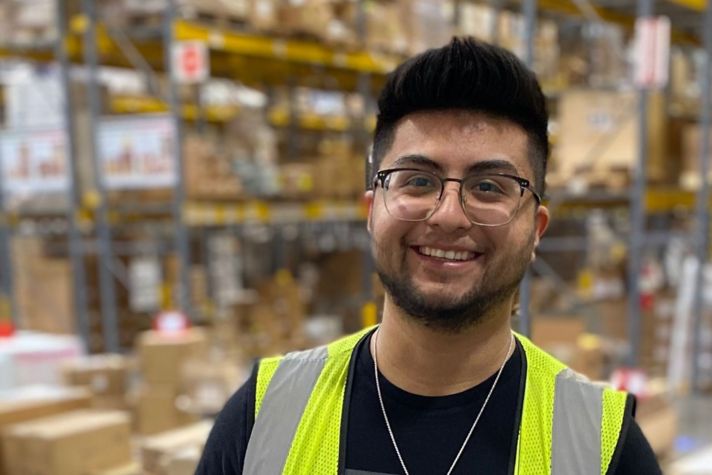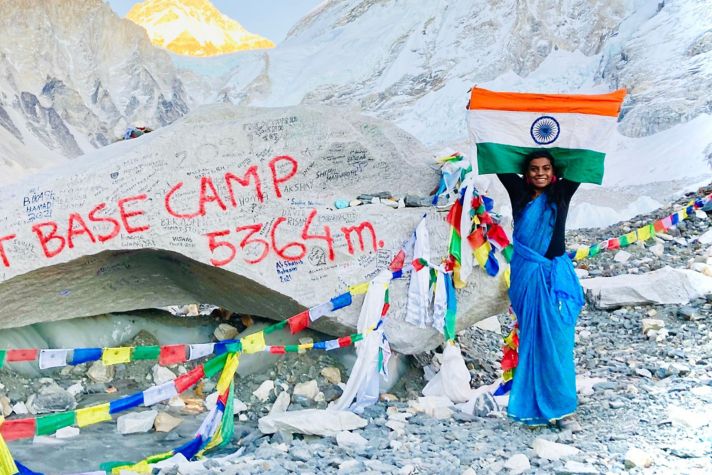-
Global
-
Africa
-
Asia Pacific
-
Europe
-
Latin America
-
Middle East
-
North America
- |
- BUSINESSES
- |
- Contact
- |
-
Global
-
Africa
-
Asia Pacific
-
Europe
-
Latin America
-
Middle East
-
North America
- |
- BUSINESSES
- |
- Contact
- |
You are browsing the product catalog for
You are viewing the overview and resources for
- News
- How Military Experience Shaped These Veterans' Careers
November 10, 2019
During deployments to Iraq, U.S. Air Force Veteran Nicole Stewart went out with a combat camera team to document voting on a constitutional referendum at polling locations around Baghdad.
Because of the volatile political situation, there were expectations that voting locations would be targets for bombings, said Nicole, who worked as a public affairs officer at the time.
"Part of the U.S. military's role was to protect those polling locations, and ensure Iraqis understood the process and that they had a place in the Iraqi political system. Men and women all over the country were brave enough to get themselves to a polling station and cast their vote,” she said, adding “It was just incredible.”
Her military experiences and officer training taught Nicole the confidence to quickly adapt to any environment and still perform at a high level, she said.
She carries that to her career today as part of the team that is focused on the next generation of helicopters for the U.S. military.
Here’s what veterans say about how their military experience shapes their current roles:
Ankur Kumar, director of corporate strategy
Served: 2002-2011, Captain in the United States Marine Corps as a helicopter pilot in San Diego and overseas
How has military experience carried over to your current role? While the missions of the military and a corporation are different, the core tenants of motivating people and working cohesively look very similar. Having been a pilot while in the service, I’m familiar with a lot of the great products our Aerospace team makes. It’s exciting to work with the incredibly smart people making the products I used to fly.
David Johnson, vice president and general manager for Honeywell Federal Solutions
Served: 23 years in various locations with the U.S. Air Force; retired with the rank of Colonel. Last assignment was at the Pentagon in Washington, D.C.
How has military experience carried over to your current role? Military members are taught to have a passion for winning. We are taught to never give up in the face of resistance and setbacks. When lives are at stake, we must have fearless accountability. The military teaches integrity and personal accountability. As leaders, we are expected to act with integrity.
Sara Weiland, director of strategic marketing for Building Management Systems
Served: 2000 to 2004 in United States Navy as an IT2 Cryptographic Manager. Led a team to encrypt telecommunications equipment and signals for top secret messaging and communications. Stationed in Naples, Italy at the Navy Telecommunications Area Master Station Europe Central
How has military experience carried over to your current role? Someone once told me, “You jump and grow wings as you fall.” The military continuously pushed me to be courageous and enabled me to build a solid foundation to stand on in my career. At 19 years old, I was responsible for people’s lives (literally) and learned the true meaning of teamwork, dedication, commitment and attention to detail. I learned that you can do anything; it just takes time and effort. Almost 20 years later, I still reflect on, and use, the skills that I acquired to build my career from technology consulting to strategic marketing.
Chris Chang, system engineer manager
Served: 1989-1996, Captain in United States Air Force, served at the L.A. Air Force Base and Air Force Academy in Colorado Springs
How has military experience carried over to your current role? I still have a sense of shared duty and purpose when I am involved in defense programs and am proud to support our military. When I started out in the Air Force, I recall being put in charge of a $1.1 million program immediately out of college and thinking it was insane. However, I put in practice the leadership skills I learned in ROTC and continued to develop that throughout my Air Force and Honeywell careers. I also had access to the best engineers that supported me and watched and learned how to solve difficult problems. I carry those skills into solving today’s problems in Honeywell.
Trevor Edwards, account manager for voice solutions
Served: 1985-1993 in the Ohio National Guard as a military policeman; activated for Desert Storm
How has military experience carried over to your current role? In the military and working with people today, the biggest things are to be yourself, be honest and listen to other people. Respect them the way you want to be respected. The Army provided me with structure that made me understand deadlines and be punctual. It also helped with a sense of respect for the chain of command. It helped me be prepared and to work through adversity. Being in Desert Storm provided me with a sense that you can’t always control what is around you, you can just be aware.
Dale Holloway, network engineer manager
Served: 1993-2001 and 2008-2012, Sergeant, Joint Network Node Team Leader, served in the U.S. Army at Fort Campbell, Kentucky and Fort Hood and Fort Bliss in Texas and in Afghanistan
How has military experience carried over to your current role? In Afghanistan, I managed a Brigade tactical network supporting 8,500 warfighters and today I manage a network that delivers internet connectivity to aircraft traveling the world. My time in the Army taught me how to persevere to achieve goals in adverse conditions. It also taught me how to operate within and contribute to a team for success. These lessons carry over daily into our practice at Honeywell. Having the ability to play off one another’s abilities while delivering customer and business value under tight timelines is crucial.
Hank Wrenn, oversees business development and projects for Honeywell Process Solutions
Served: Eight years in the U.S. Navy Reserve at the Naval Air Station Joint Reserve Base in New Orleans and around the world. Avitation Mechanic 3rd Class, working primarily on airframe structures and hydraulic systems and as a flight engineer on aircraft and as a weapons instructor.
How has military experience carried over to your current role? Having to adjust to different conditions in the Navy helped me understand the reason for change and embrace it. This has helped me be a better leader for Honeywell. I signed up to do one job in the Navy, but as times changed I adapted to different conditions. If you look at the world today and how fast we are changing, Honeywell has also stepped up our approach to be flexible to change.
Copyright © 2025 Honeywell International Inc.




